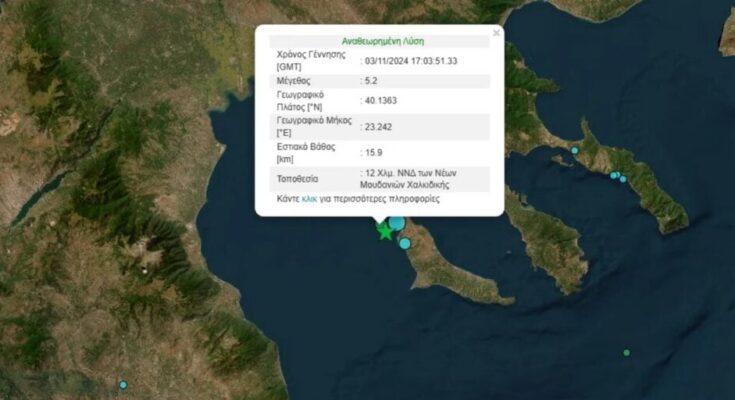
Seismologists have been reassuring the public after the strong 5.2 earthquake that hit Halkidiki, northern Greece on Sunday. The quake was felt across Greece’s second-largest city, Thessaloniki, but there are no reports of injuries or damage.
“Such earthquakes are very common in the region” commented the seismologist Kostas Papazachos. Speaking on OPEN TV he said, it is not improbable that a large aftershock may occur, but added that this something that is common and should not alarm residents.
The Professor of Geophysics at the Thessaloniki University stated: “The fear is not justified. Such earthquakes are very common in the region, 15-20 occur every year. It should not concern us because it is an area of relatively low seismicity and we do not have large faults.”
As for the next few days after the earthquake, he advised residents to be prepared for aftershocks. “The aftershock sequence is rich, and in the coming weeks residents will feel earthquakes and should prepare. It is not unlikely that a strong aftershock of 4.6, or 4.8 may occur,” said Papazachos.
“There is no earthquake-free region in Greece. What worries us are earthquakes over 6.5. We certainly will not have a very big earthquake, but a 5.2 earthquake again soon cannot be ruled out.”
The seismic tremors in the sea area south, southwest of the town of Nea Moudania, which shook the area of Kassandra in Halkidiki, but also several areas of Macedonia, have caused concern to the residents.
The quake occurred at 7:03 p.m. local time (5:03 p.m. GMT), with its epicenter being located twelve kilometers (7.5 miles) southeast of the town of Nea Moudania.
The earthquake had a depth of five kilometers (three miles), which is relatively shallow, making the tremors much stronger in the broader region.
Strong aftershocks
Only a few minutes after the initial tremor, a strong aftershock with a magnitude of 4.3 on the Richter scale was recorded.
The 4.3-strong quake took place at 7:07 p.m., and its epicenter was located ten kilometers (six miles) south of the Nea Moudania region.
Five minutes later, a third earthquake was reported, with a magnitude of 2.8 on the Richter scale.
Not the first earthquake in Greece this year
This was not the first quake that rattled Greece this year. The most recent and significant earthquake that was reported in the country was on the island of Evia in late August.
According to the Geodynamic Institute of the National Observatory of Athens, the earthquake had a magnitude of 4.5 on the Richter scale.
It struck at 10:53 p.m. local time, with its epicenter located in northern Evia, specifically 4 kilometers (2.5 miles) southeast of Vasiliki Istiaia. The earthquake’s focal depth was 15.4 kilometers (9.5 miles).
Northern Evia had experienced a total of seven earthquakes in less than two days. Except for the 4.5 magnitude quake, all the other tremors were below two on the Richter scale.



